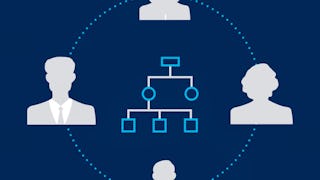- Browse
- Behavioral Economics
Behavioral Economics Courses
Behavioral economics courses can help you learn decision-making processes, cognitive biases, and the impact of social influences on economic behavior. You can build skills in analyzing consumer behavior, designing effective interventions, and applying experimental methods to test hypotheses. Many courses introduce tools like statistical software for data analysis and survey platforms for gathering insights, helping you apply these skills to practical work in marketing, public policy, and finance.
Popular Behavioral Economics Courses and Certifications
 Status: Free TrialFree TrialU
Status: Free TrialFree TrialUUniversity of Colorado Boulder
Skills you'll gain: Sustainable Design, Sustainable Technologies, Sustainable Engineering, Sustainable Business, Sustainable Development, Organizational Leadership, Business Leadership, Waste Minimization, Environmental Engineering, Product Engineering, Packaging and Labeling, Climate Change Mitigation, Product Lifecycle Management
Build toward a degree
4.6·Rating, 4.6 out of 5 stars50 reviewsIntermediate · Course · 1 - 3 Months
 Status: FreeFreeR
Status: FreeFreeRRutgers the State University of New Jersey
Skills you'll gain: Political Sciences, Policy Analysis, Social Sciences, Social Justice, Economics, Policy, and Social Studies, Public Policies, Governance, Law, Regulation, and Compliance, Ethical Standards And Conduct
4.7·Rating, 4.7 out of 5 stars38 reviewsBeginner · Course · 1 - 3 Months
 Status: Free TrialFree TrialE
Status: Free TrialFree TrialEESADE Business and Law School
Skills you'll gain: Technology Strategies, Business, Family Support, Innovation, Business Leadership, Business Management, Business Transformation, Economics, Industrial and Organizational Psychology, Market Dynamics, Entrepreneurship, Environmental Social And Corporate Governance (ESG), International Relations, Personal Development, Self-Awareness, Demography, Decision Making
4.5·Rating, 4.5 out of 5 stars31 reviewsMixed · Course · 1 - 4 Weeks
 Status: Free TrialFree TrialU
Status: Free TrialFree TrialUUniversity of Illinois Urbana-Champaign
Skills you'll gain: Portfolio Risk, Return On Investment, Economics
Beginner · Course · 1 - 4 Weeks
 Status: PreviewPreviewU
Status: PreviewPreviewUUniversity of Geneva
Skills you'll gain: Ancient History, Art History, World History, European History, Culture, Timelines, Economics, Case Studies
4.5·Rating, 4.5 out of 5 stars32 reviewsBeginner · Course · 1 - 3 Months
 Status: Free TrialFree TrialT
Status: Free TrialFree TrialTTecnológico de Monterrey
Skills you'll gain: Oncology, Health Promotion, Behavioral Health, Mental and Behavioral Health Specialties, Public Health and Disease Prevention, Health Care, Mental Health, Chronic Diseases, Psychology, Exercise Science, Stress Management, Physiology, Neurology, Endocrinology, Immunology
4.8·Rating, 4.8 out of 5 stars91 reviewsBeginner · Course · 1 - 4 Weeks
 Status: Free TrialFree Trial
Status: Free TrialFree TrialSkills you'll gain: Prompt Engineering, Debugging, ChatGPT, Pseudocode, AI Enablement, Web Development, Code Review, Web Development Tools, Artificial Intelligence, Web Applications, Software Development, Programming Principles, Software Engineering
4.3·Rating, 4.3 out of 5 stars31 reviewsIntermediate · Course · 1 - 4 Weeks
 Status: Free TrialFree TrialI
Status: Free TrialFree TrialIIESE Business School
Skills you'll gain: Media Relations, Public Speaking, Media and Communications, Communication Strategies, Strategic Communication, Media Strategy, Verbal Communication Skills, Public Relations, Digital Marketing, Press Releases, Communication, Marketing Communications, Presentations, Non-Verbal Communication, Journalism
4.9·Rating, 4.9 out of 5 stars30 reviewsBeginner · Course · 1 - 4 Weeks
 Status: PreviewPreviewP
Status: PreviewPreviewPPontificia Universidad Católica de Chile
Skills you'll gain: Traffic Flow Optimization, Transportation Operations, Supply And Demand, Network Analysis, Network Model, Mathematical Modeling, Game Theory, Graph Theory, Economics, Algorithms, Applied Mathematics
4.9·Rating, 4.9 out of 5 stars56 reviewsBeginner · Course · 1 - 3 Months
 Status: Free TrialFree TrialF
Status: Free TrialFree TrialFFundação Instituto de Administração
Skills you'll gain: Logistics, Logistics Management, Export Control, International Finance, Transportation Management, Supply Chain, Entrepreneurship, Market Opportunities, Market Research, Regulatory Compliance, Operational Efficiency, Commercial Laws, Negotiation
4.7·Rating, 4.7 out of 5 stars39 reviewsBeginner · Course · 1 - 4 Weeks
 Status: Free TrialFree TrialY
Status: Free TrialFree TrialYYunus Social Business Fund Bengaluru
Skills you'll gain: Social Impact, Sustainable Development, Sustainable Business, Corporate Sustainability, Professional Networking, Entrepreneurship, Financial Inclusion, Business Strategies, Business Strategy, Business Ethics, Business Modeling, Economics
Beginner · Course · 1 - 3 Months
 Status: Free TrialFree TrialU
Status: Free TrialFree TrialUUniversity of Colorado Boulder
Skills you'll gain: Requirements Management, Design Reviews, Systems Engineering, Engineering Management, User Requirements Documents, Requirements Analysis, Systems Design, Business Requirements, Software Engineering, Systems Integration, Leadership, Engineering Design Process, Performance Measurement, Manufacturing and Production, Coordination, Data-Driven Decision-Making, Decision Making
Build toward a degree
4.8·Rating, 4.8 out of 5 stars37 reviewsBeginner · Course · 1 - 3 Months
Searches related to behavioral economics
In summary, here are 10 of our most popular behavioral economics courses
- Applied Sustainability Engineering: University of Colorado Boulder
- Revolutionary Ideas: Borders, Elections, Constitutions, Prisons: Rutgers the State University of New Jersey
- La familia empresaria: individuo, dinámica y tiempo: ESADE Business and Law School
- Investing and Building Wealth: University of Illinois Urbana-Champaign
- A l’avènement du christianisme : l’archéologie des derniers païens: University of Geneva
- Psicología de la salud: Tecnológico de Monterrey
- Prompt Engineering for Web Developers: Scrimba
- The Role of the Media : IESE Business School
- ¿Cómo viajamos por la ciudad? Asignación y equilibrio en redes de transporte.: Pontificia Universidad Católica de Chile
- Sistemática de Comércio Exterior: Fundação Instituto de Administração










